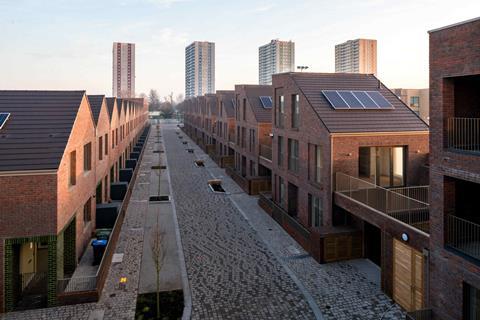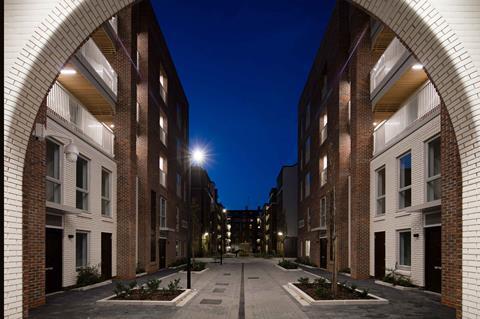Support local authorities to solve housing crisis for good and create 250,000 jobs, says RIBA
The government needs to invest urgently in local authorities to prompt a wave of high quality council housebuilding, according to a report from the Riba.
The report says resourcing local authorities to deliver a generation of council housing across the country, and reforming the way it is procured, would end the housing crisis and create 250,000 jobs.
The charity Crisis has calculated that the government needs to build 90,000 new affordable homes a year to meet demand. In 2018, 13,000 new homes were delivered by local authorities.
“If the government is serious about ‘Building Back Better’ it needs to back local authorities to invest in their communities and build homes fit for the future,” said Riba president, Alan Jones.

The institute published a 60-page report called Homes for all: Putting council housing at the heart of the local recovery.
It said the devastating impact of the pandemic had “cruelly highlighted” that housing policy and funding had failed to meet the changing needs of society.
It argues that Whitehall should set higher standards, invest in the built environment and drive reform of the construction industry. Its recommendations cover the financing, procurement and oversight of new social housing and include:
• Treasury removes borrowing and spending restrictions on local authorities and provides grant funding for new social housing to help lower long-term housing support costs.
• Treasury removes the legal requirement for public sector bodies to dispose of land “for best consideration” and consult on a replacement which more closely aligns to social value, sustainability and housing delivery goals.
• Ministry of Housing (MHCLG) provides local authorities with freedom to set their own planning fees to ensure they can adequately invest in resourcing to cover development management responsibilities.
• MHCLG should engage local authority legal, finance and procurement teams to improve understanding of the value-for-money benefits of investing in quality, while local authorities should insist design teams are retained post novation.
• Homes England explores solutions to meet capacity shortages in local government planning teams and places greater emphasis on quality design in funding programmes.
• Local authorities adopt a strong client role in their affordable housing delivery programmes to ensure that there is adequate oversight of how quality will be maintained throughout projects.

The report spotlights a series of local authority schemes it considers best practice, including Mikhail Riches’ Stirling Prize-winning Goldsmith Street in Norwich, Matthew Lloyd Architects’ Bourne Estate in Camden, Gale & Snowden’s Chester Long Court in Exeter and Karakusevic Carson and Maccreanor Lavington’s Dujardin Mews in Enfield.
It also praises Brick by Brick, Croydon council’s development company which is currently in talks to be sold after an independent audit criticised the authority’s management of its finances.
The report, based on two years of interviews with architects, planners and local government officials, devotes considerable space to the issue of procurement, which it said had a major impact on the quality of housing.
“Public sector procurement practices often make it hard to deliver quality and value,” it said, adding: “As the Building Better Building Beautiful Commission noted, the UK is not alone in using procurement rules derived from the European Procurement Directives, but our outcomes are consistently less imaginative, less sustainable and more expensive than those achieved in neighbouring countries.”
RIBA president Alan Jones said the UK had some of the worst housing in Europe.
“Too many people find themselves living in sub-standard, unhealthy housing that fails to meet their needs,” he added.
“There are over one million households on the waiting list for social housing in England alone, with many of these are currently living in poorly maintained, short-term and expensive privately rented homes. This is a stark illustration of the scale of our housing crisis.
“We urgently need a radical new approach to council housing that will deliver safe, low-carbon, healthy homes and spaces around them. Housing that creates identity, pride and belonging, and helps to drive the recovery from the economic impact of covid-19 by creating new jobs and boosting our economy. With wide-ranging reforms to the planning system on the agenda, it is vital that government addresses the factors that have contributed to the failing system.
“If the government is serious about ‘Building Back Better’ it needs to back local authorities to invest in their communities and build homes fit for the future.”










1 Readers' comment